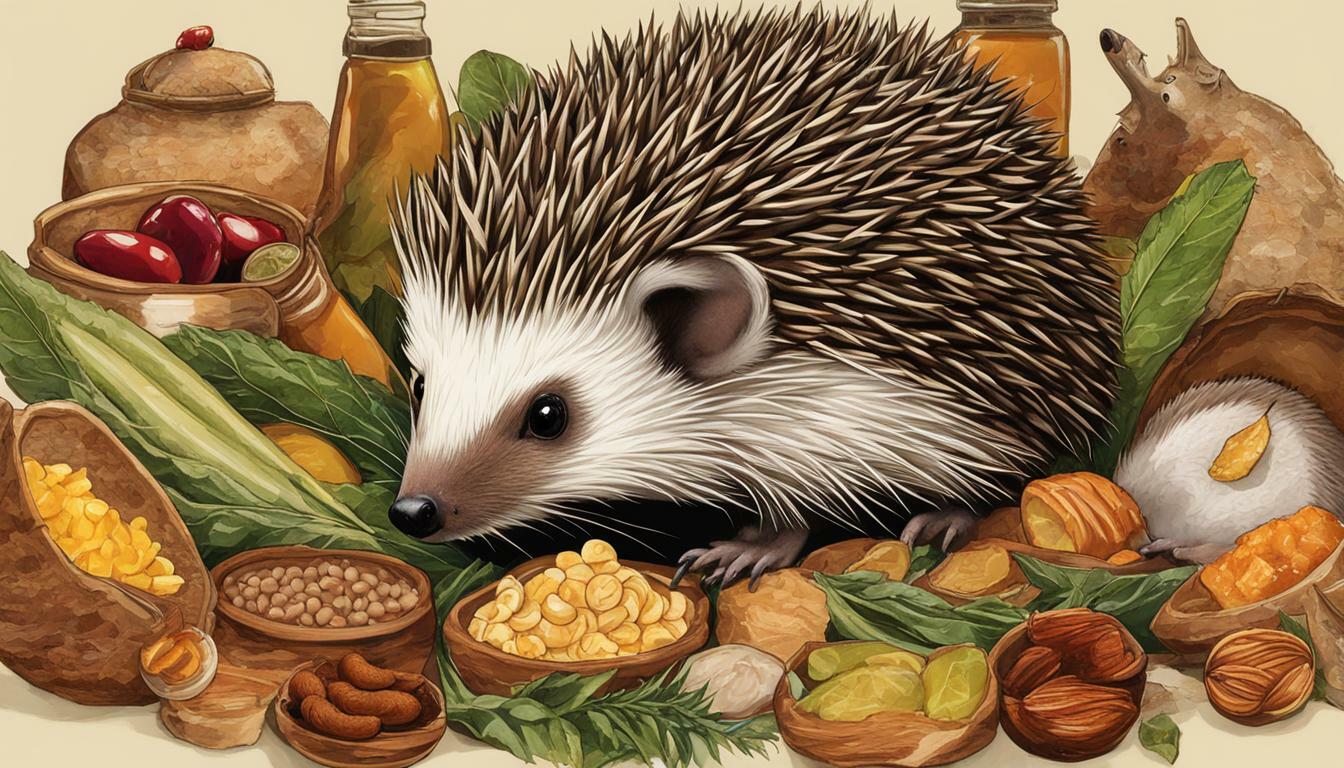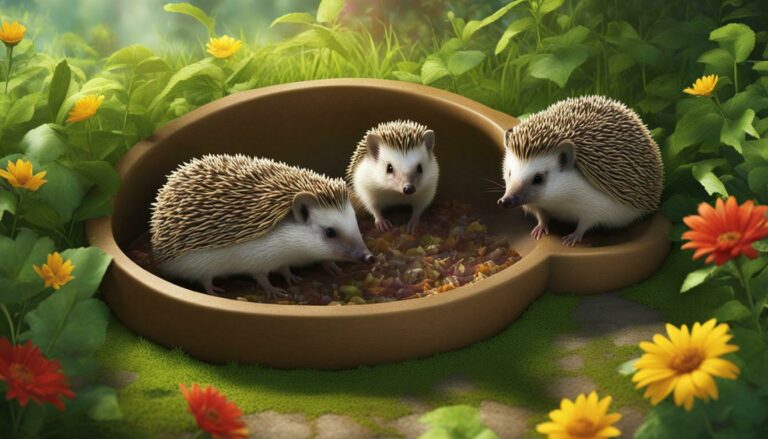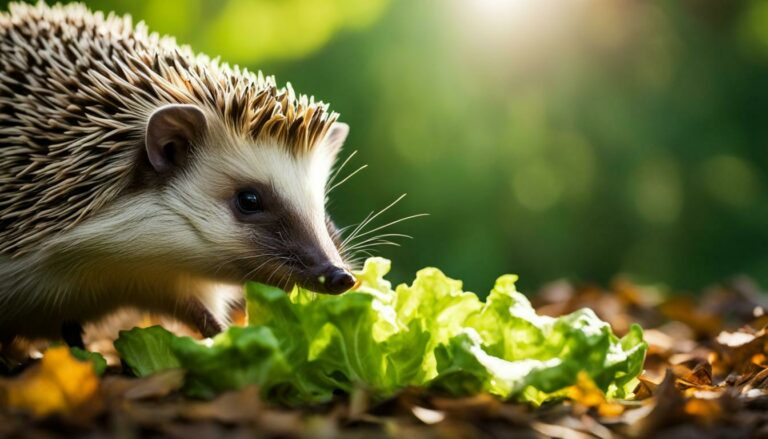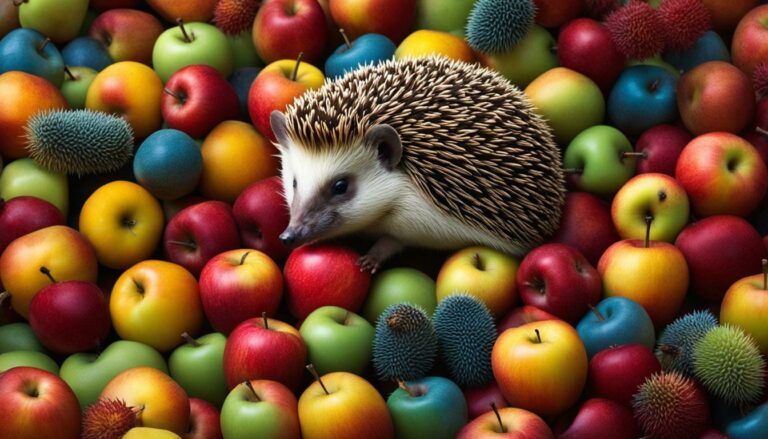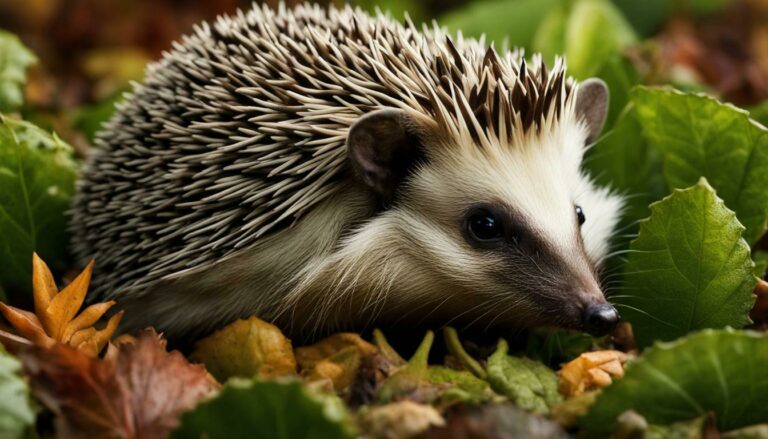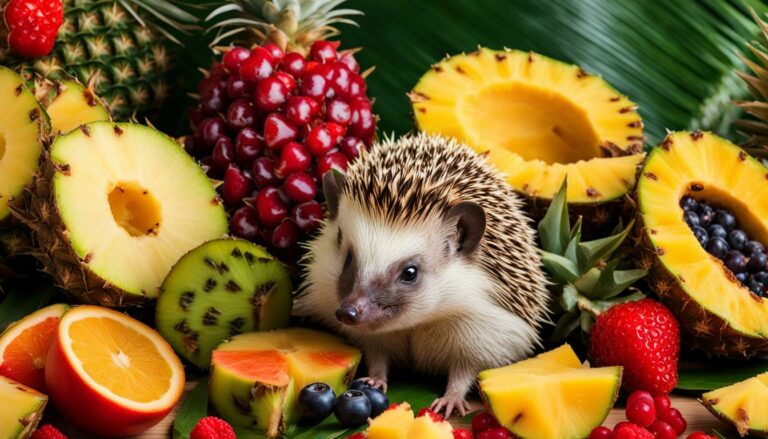Can Hedgehogs Eat Dubia Roaches? Essential Guide.
Hedgehog owners often wonder if it is safe to feed their pets dubia roaches. In this essential guide, we will explore the potential benefits and risks of including dubia roaches in a hedgehog’s diet, as well as provide insights into the nutritional value of these insects.
Key Takeaways:
- Dubia roaches are a type of cockroach primarily found in the southern regions of South America.
- They are medium-sized insects that reach a length of around 1.5 – 1.7 inches (3.8 to 4.3 cm) when fully mature.
- Dubia roaches are popular as feeder insects due to their nutritional value and ease of breeding.
- They are rich in protein, which is an essential nutrient for hedgehogs.
- Dubia roaches also provide hydration, can be gut-loaded for additional nutrients, and have a lower fat content compared to other feeders.
- When feeding dubia roaches to hedgehogs, it is important to obtain them from a reputable source to avoid potential health risks from wild roaches.
- Selecting healthy dubia roaches involves checking for cleanliness, activity, and physical appearance.
- Gut-loading dubia roaches with calcium-rich foods or dusting them with calcium powder can help balance their calcium-to-phosphorus ratio for hedgehog consumption.
- Feeding dubia roaches to hedgehogs should be done in moderation and as part of a balanced diet.
- Proper storage and housing of dubia roaches are important to maintain their freshness and breeding colonies if necessary.
What Are Dubia Roaches?
Dubia roaches, scientifically known as Blaptica dubia, are medium-sized cockroaches primarily found in the southern regions of South America. These insects serve as popular feeder insects due to their nutritional value and ease of cultivation.
Dubia roaches are typically around 1.5 to 1.7 inches (3.8 to 4.3 cm) in length when fully mature. They primarily feed on fruits and grains, although they also consume high-protein foods such as meat and animal waste. These roaches are known for their relatively slow movements and non-aggressive nature, making them an ideal food source for a variety of pets.
When it comes to their nutritional value, dubia roaches are packed with multiple nutrients that are essential for the health of animals. These insects are rich in protein, making them a valuable source of this vital nutrient for pets such as hedgehogs. Additionally, dubia roaches have a reasonably low fat content compared to other feeder insects, which can help prevent obesity in hedgehogs that tend to overeat fatty foods. They also have a high moisture content, contributing to hydration. However, it’s important to note that the calcium-to-phosphorus ratio in dubia roaches may not be ideal for hedgehogs, but this can be easily supplemented through gut-loading or dusting with calcium powder before feeding.
| Fact | Value |
|---|---|
| Scientific Name | Blaptica dubia |
| Size | Around 1.5 to 1.7 inches (3.8 to 4.3 cm) |
| Nutritional Value | High in protein, low in fat, and high moisture content |
| Feeding Habits | Primarily fruits and grains, with occasional high-protein foods |
Summary:
Dubia roaches, scientifically known as Blaptica dubia, are medium-sized cockroaches found in South America. They are popular feeder insects due to their nutritional value and ease of cultivation. These roaches are rich in protein, have a low fat content, and provide hydration. However, their calcium-to-phosphorus ratio may not be ideal for hedgehogs, but this can be supplemented through gut-loading or dusting with calcium powder before feeding. Overall, dubia roaches make a nutritious and beneficial addition to a hedgehog’s diet.
Health Benefits Of Dubia Roaches For Hedgehogs
Dubia roaches offer several health benefits for hedgehogs, including being a rich source of protein, providing hydration, and serving as a vehicle for gut-loading. Protein is an essential nutrient for hedgehogs as it supports their immune systems and helps maintain the proper functioning of their tissues and organs.
Additionally, dubia roaches contain a high moisture content, contributing to hedgehogs’ hydration needs. With approximately 65% – 71% moisture, dubia roaches can help keep hedgehogs well-hydrated.
Gut-loading is the practice of feeding nutritious foods to insects before offering them to hedgehogs. Dubia roaches are excellent candidates for gut-loading because they can eat twice their body weight in food. This means they can carry additional nutrients, such as vitamins and minerals, which they can then transmit to hedgehogs.
Furthermore, dubia roaches have a relatively low fat content, containing about 6% fat. This makes them a suitable option for hedgehogs, as excessive fat intake can lead to obesity. By incorporating dubia roaches into a balanced diet, hedgehogs can receive the necessary nutrients without risking weight gain.
| Benefit | Description |
|---|---|
| Protein | Serves as an essential nutrient for hedgehogs, supporting their immune systems and maintaining tissue and organ health. |
| Hydration | Provides moisture to hedgehogs, helping to keep them well-hydrated. |
| Gut-Loading | Enables the transmission of additional nutrients from dubia roaches to hedgehogs. |
| Fat | Contains a relatively low fat content, reducing the risk of obesity in hedgehogs. |
Health Risks Of Dubia Roaches For Hedgehogs
While dubia roaches can be a safe food option for hedgehogs, it is crucial to avoid feeding them wild roaches, as these may contain harmful bacteria and parasites that can lead to illness. It is best to purchase dubia roaches from reputable sellers or breed them yourself to ensure their safety and quality.
Wild roaches can carry various pathogens, including harmful bacteria and parasites, which can cause gastrointestinal issues, infections, and other health problems in hedgehogs. By feeding your hedgehog wild roaches, you expose them to these potential risks.
To ensure the safety of your hedgehog’s food, it is important to source dubia roaches from reliable sellers or breed them yourself. Reputable sellers ensure that their roaches are free from harmful pathogens and have been properly cared for. Breeding your own dubia roaches allows you to have control over their environment and diet, reducing the risk of contamination.
Safe Consumption of Dubia Roaches for Hedgehogs
When feeding dubia roaches to your hedgehog, it is essential to practice proper hygiene and food safety measures. Handle the roaches with clean tongs or gloves to prevent contamination. Avoid feeding roaches that show signs of illness or lethargy, as they may indicate poor health or disease.
Gut-loading the dubia roaches before feeding them to your hedgehog can enhance their nutritional value. Feeding high-quality fruits, vegetables, and nutritious gut-loading foods to the roaches ensures that they pass on essential nutrients to your hedgehog.
Regularly clean the feeding area and remove any uneaten roaches to prevent bacterial growth and maintain a clean environment for your hedgehog. Proper storage of dubia roaches is also important to prevent any contamination or infestation. Store them in a secure container with smooth sides and adequate ventilation.
| Health Risks | Prevention |
|---|---|
| Bacterial contamination | Avoid feeding wild roaches and purchase from reputable sellers or breed them yourself |
| Parasitic infections | Practice good hygiene when handling roaches, and gut-load them with nutritious foods |
| Proper storage and cleaning | Store roaches in a secure container and maintain a clean feeding environment |
How To Pick The Best Dubia Roaches For Your Hedgehog
When selecting dubia roaches for your hedgehog, it is important to choose clean and active insects that appear healthy and well-nourished. Here are a few things to look out for:
- Cleanliness: Opt for dubia roaches that are free from visible dirt or debris. Clean feeders are essential to ensure the health and well-being of your hedgehog.
- Activity Level: Dubia roaches are typically active insects that do not stay still for long periods of time. Avoid purchasing roaches that appear lethargic or unable to move properly, as they may not be in good health.
- Physical Appearance: Healthy dubia roaches should have rounded bodies and a shiny, dark brown color. Avoid purchasing roaches that look emaciated, thin, or have multicolored markings, as these may indicate poor condition.
By selecting dubia roaches that meet these criteria, you can ensure that your hedgehog is receiving the best possible food source. Remember to always purchase from reputable sellers or consider breeding your own dubia roaches to ensure their safety and nutritional value.
Table: Comparison of Dubia Roaches and Regular Roaches
| Characteristic | Dubia Roaches | Regular Roaches |
|---|---|---|
| Nutritional Value | High in protein, fiber, and calcium | Low nutritional value, potential for parasites |
| Fat Content | Lower fat content, suitable for moderation | Higher fat content, potential for weight gain |
| Source | Farmed specifically for nutritional value | Wild-caught, potential for bacteria and parasites |
By understanding the differences between dubia roaches and regular roaches, you can confidently choose the best option for your hedgehog’s diet.
How To Feed Dubia Roaches To Your Hedgehog
To maximize the nutritional benefits of dubia roaches for your hedgehog, it is recommended to gut-load the insects before offering them as a meal. Gut-loading is the process of feeding the roaches nutritious foods that will enhance their nutritional content. For a day or two before feeding them to your hedgehog, provide the dubia roaches with a diet of fresh fruits and vegetables. This will ensure that they are packed with essential nutrients that your hedgehog needs.
When it comes to serving the dubia roaches to your hedgehog, there are a few methods you can try. You can use a pair of tongs to hold the roach and present it to your hedgehog. Alternatively, you can put on some gloves and offer the roach directly. Allow your hedgehog to grab the roach from the tongs or your hand, and let them enjoy their meal.
Once your hedgehog is done eating, it is important to clean up any leftover roaches or debris. Leaving food remnants in your hedgehog’s enclosure can attract pests and cause hygiene issues. Make sure to remove any uneaten roaches and wipe down the feeding area to maintain a clean and sanitary environment for your hedgehog.
FAQ
Q: Can hedgehogs eat dubia roaches?
A: Yes, dubia roaches can be a healthy addition to a hedgehog’s diet. They are rich in protein and hydration, and they can be gut-loaded to provide additional nutrients. However, it is important to only feed captive-bred dubia roaches to hedgehogs to avoid potential health risks from wild roaches.
Q: What are dubia roaches?
A: Dubia roaches are a type of cockroach found in the southern regions of South America. They are medium-sized, reaching a length of around 1.5 – 1.7 inches when fully mature. Dubia roaches primarily feed on fruits and grains, but they also consume high-protein foods. They are popular as feeder insects due to their nutritional value.
Q: What are the health benefits of dubia roaches for hedgehogs?
A: Dubia roaches provide several health benefits for hedgehogs. They are rich in protein, which supports the immune system and helps with tissue and organ function. They also contain moisture, contributing to hydration. Dubia roaches can be gut-loaded with additional nutrients. They have a lower fat content than other feeders, reducing the risk of obesity in hedgehogs. However, the calcium-to-phosphorus ratio in dubia roaches may need to be adjusted for hedgehogs.
Q: What are the health risks of dubia roaches for hedgehogs?
A: Wild dubia roaches may carry harmful bacteria and parasites that can make hedgehogs sick if consumed. It is important to purchase dubia roaches from reputable sellers or breed them yourself to ensure safety for hedgehogs. Avoid feeding hedgehogs wild roaches found in the backyard or house.
Q: How should I pick the best dubia roaches for my hedgehog?
A: When selecting dubia roaches for hedgehogs, look for clean and dirt-free insects. Avoid roaches that are lethargic or unable to move properly. Healthy dubia roaches should be shiny, dark brown, and have rounded bodies. Avoid emaciated, thin, or multicolored roaches.
Q: How should I feed dubia roaches to my hedgehog?
A: Before feeding dubia roaches to hedgehogs, it is recommended to gut-load them by feeding them fresh fruits and vegetables. Offer the dubia roach to the hedgehog using tongs or gloves, and let the hedgehog grab it. Clean up after the hedgehog is done eating.
Q: How often can hedgehogs eat dubia roaches?
A: Hedgehogs can eat dubia roaches daily as part of their diet. However, it is important to provide a balanced diet and not rely solely on dubia roaches.
Q: How should I store dubia roaches?
A: Dubia roaches can be stored in a large opaque plastic container. The container should be well-ventilated and securely closed to prevent escape. The ideal temperature for dubia roaches is around 85º-90ºF. It is important to provide supplemental heat if the temperature frequently drops below this range.
